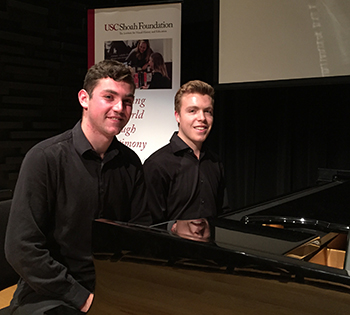
Ambrose Soehn and Alex Biniaz-Harris
(Alex Biniaz-Harris, left, and Ambrose Soehn)
The composers behind the three-movement piano piece featured in the documentary Melodies of Auschwitz, now playing on Comcast Xfinity’s Days of Remembrance: PastFORWARD broadcast, reunited for a screening and concert at USC’s Brain and Creativity Institute this week and spoke candidly about their journey from page to performance.
Before performing their piece live, Ambrose Soehn and Alex Biniaz-Harris, graduating seniors at USC, spoke with USC Shoah Foundation Executive Director Stephen Smith about the process of composing such an emotional, personal piece of music. They began by reflecting on what it was like to actually perform their piece in Krakow, in front of an audience of Auschwitz survivors and their families.
Biniaz-Harris said performing in front of the survivors, who included his own grandmother, was a highlight of his life. Soehn noted that they were surprised to see how some of the survivors reacted to their music; a few even stood up because one of the piece’s themes sounds like the national anthem of Israel. Evoking such powerful reactions from the survivors was an unexpected surprise, but it helped put them at ease, Biniaz-Harris said.
“It eased the pressure a little bit. We knew they were welcoming,” Biniaz-Harris said.
The day after their performance in Krakow, they attended the official commemoration ceremony of the 70th anniversary of liberation at Auschwitz-Birkenau State Museum. The ceremony was held on a cold January evening, and after the ceremony many attendees walked from the Death Gate to the ruins of the crematoria to place candles. Spotlights were positioned to make it look as if a train was coming through the Death Gate like it did during the Holocaust.
Both Soehn and Biniaz-Harris said being at Auschwitz-Birkenau that night helped them understand just a fraction of what the survivors and victims of Auschwitz had been through, and the fear, pain and confusion they must have felt.
“That was extremely haunting for me, given that it was bitter cold and I wasn’t properly dressed and had absolutely no idea how I would have possibly survived anything like that,” Soehn said.
Biniaz-Harris added that although he had visited Auschwitz one summer years ago with his dad and brother, the impact of being there was far more intense this time because of the extreme cold. The experience enhanced his performance and his emotional expression of the music, he said.
Soehn is studying music and neuroscience, and said that his scientific studies have shown him how powerful music can be for trauma survivors and future generations. Some memories are so traumatic, he said, that survivors are literally unable to process them with language. Music can provide a way for them to work through their emotions and share their experiences with others even when they don’t have the words. Then, artists like Soehn and Biniaz-Harris can draw on their music to construct their own response.
“Art provides a way [survivors] can manifest and process though these memories that language simply doesn’t allow for,” Soehn said. “So you get these amazingly beautiful, haunting artistic works that can be used as inspiration for other things.”
At the end of the conversation, Biniaz-Harris and Soehn were asked to reflect on their time interning at USC Shoah Foundation and how it will influence their futures.
Biniaz-Harris said his internship was the best job you can have at USC. It has inspired him to one day work in teaching or the non-profit world, so that he can give back.
“I’ve learned so much from my coworkers who are awesome,” he said. “Not to mention, the wealth of knowledge I get from watching testimony all the time has been invaluable.”
Soehn said he has realized how important it is for his generation to remember and learn from the past. Composing the piece for Auschwitz also inspired him to seek out other unique artistic opportunities.
“This job has opened my eyes to the vast trove of inspiration and things that have happened that I can use as an artist to express myself,” Soehn said.